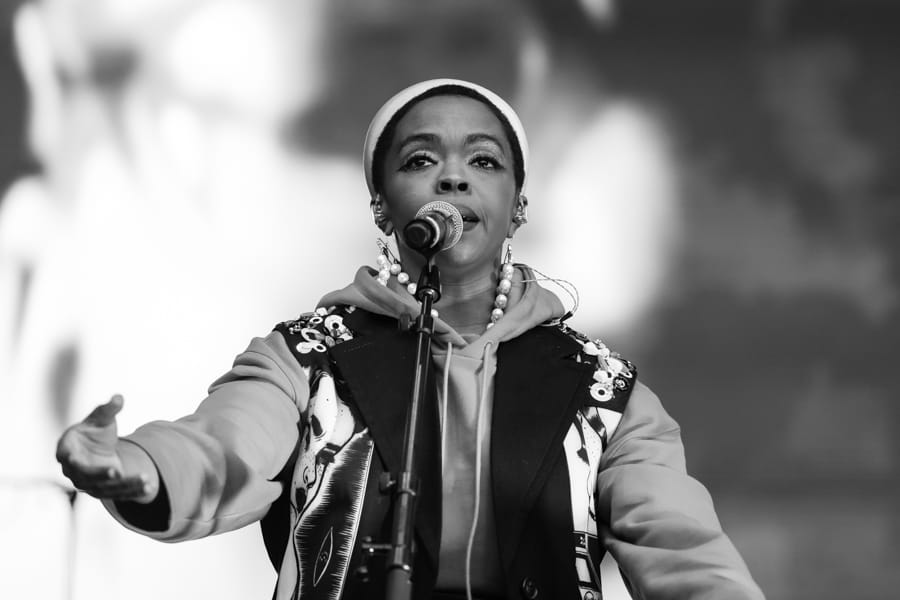How Good Is Lauryn Hill, Really?: Reviewing Apple Music's Top 100 Albums

Recently, Apple Music released their Top 100 Albums of all time, compiled with the help of industry professionals and performers. The choice to release the list weekly, 10 albums at a time, further reinforces what any critic could already realize about the list: it is a publicity stunt from a streaming service that remains second to Spotify. It remains an interesting study in artistic consensus, and the divisiveness it had and the albums it chose to forsake tell an interesting story of modern cultural criticism, especially for the rap community, which was largely snubbed.
Many of the choices between #100-#51 are very silly. There are some inclusions that are mystifying, even when it comes to different albums by the same artist: George Michael's classic Faith is passed over for the random Listen Without Prejudice; Lorde's freshman effort Pure Heroine is selected over her masterpiece Melodrama; Travis Scott's mediocre Astroworld beats out his sublime Rodeo. Many of the picks are made even more confusing by the omissions: Tyler the Creator's Igor and Kendrick Lamar's good kid, m.a.d.d. city didn't make the list, but Robyn's Body Talk and 50 Cent's Get Rich or Die Tryin' did?
Still, there is a subtle wisdom to the list. It aims to be a more modern, well-rounded alternative to the oft-criticized Rolling Stone Top 500 Albums, which focused on traditional rock, pop and blues and was overwhelmingly white, male and outdated. The entries of Lana Del Rey, The Smiths and Portishead are sure to satisfy the sad girls; paying tribute to Sade, SZA and D'Angelo satisfies the underrepresented genre of R&B. The order of the bottom 50 seems arbitrary, with lauded albums below uneven duds. Again, the "of all time" nature of the list makes its very nature eccentric, with John Coltrane buttressed between Rihanna and Guns N' Roses. Halfway through, it occurs to the reader that perhaps a list of the nature is unmerited, or even impossible to create.
It's hard to argue with the albums between #11-#50. If not masterpieces, they are at least classics, and the shortsighted additions of Alanis Morisette's Jagged Little Pill and Beyonce's dull eponymous album are soothed by the elevation of Wu-Tang Clan's breakout and Carole King's wonderful Tapestry. Again, the arrangement seems random, scattered, as if the list was created in no particular order instead of in a purposeful heirarchy. The lead-up to the top 10 is populated with genre-defining works: Joni Mitchell's Blue, Dylan's Highway 61 Revisited. A few made the single-digit cut in the Rolling Stone list but here are relegated to the early teens, namely Fleetwood Mac's Rumours and Radiohead's Ok Computer.
Beyonce's poetry-pop breakup anthem Lemonade earns #10. It's an album with limited replay value, but much artistry and emotion, yet I think in it's genre JAY-Z's 4:44 or Mitchell's Blue deserved the Top 10 slot more. Of course, Beyonce's Grammy snub earned much controversy when she was beaten by Adele, but the latter's 25 may have made a better addition here also.
Nirvana's Nevermind wins #9. I've always preferred In Utero's raw, masterful songwriting over Nevermind's rough sketch of a project. It's easy to recognize its impact on putting the Seattle grunge on the map, but is the list evaluating most transformative albums or best? If it's the latter, then U2's Joshua Tree or Pearl Jam's Ten probably deserved the spot more.
Next is Amy Winehouse's Back to Black. Another breakup album, Winehouse is a better singer than she is songwriter, and it shows in the back half. This could easily have made the top 100, but the eighth best album of all time is a stretch.
Lamar's good kid, m.a.d.d. city is a traditional (albeit very good) West Coast rap album in the vein of 2Pac or Dre, but it gets the nod here over his transformative masterwork To Pimp A Butterfly. This choice frustrated many fans, especially as his sophomore project didn't make the list at all. Simply interchanging Kendrick's projects here could have made a big difference.
Songs In the Key of Life is a perfect album by an American treasure, Stevie Wonder. It deserves every accolade it got, not the least of which its sixth place ranking.
The inclusion of Frank Ocean's Blonde is meant to show you that this is not like other lists. It's modern, and very hip. Young people love Frank Ocean.
Prince's Purple Rain is complicated and fiercely individualistic. It has three beautiful rock ballads, but most of the rest of the album is filler. Kiss or Around the World in a Day may have made a better addition, but it's difficult to imagine Prince having an album worthy of a top 10 playlist, despite his status as a skilled musician and artist.
Abbey Road is another case of an artist's best album (The Beatles, commonly referred to as The White Album, or maybe Revolver) usurped by a forgettable entry. Abbey Road wouldn't be No. 3 on a list of the best Beatles albums, much less the best of all time.
Thriller is not only the highest-selling record of all time, but also a pop masterpiece laden with hits. It makes sense to win second place, even if it's not a personal favorite of mine.
Apple Music made a particular choice putting The Miseducation of Lauryn Hill as the greatest. It's not an expected choice, and it could even be considered somewhat subversive. As a mid '90s record, it dodges accusations of recency bias and of being stuck in the past, and it's by a well-liked artist with few detractors. The challenge of picking a greatest is the same as with making the list. The unexpected realization is that it may be impossible; the problem is that no album will ever be good enough to be #1 without criticism or question. Any choice will leave us with the same thought: how good is Lauryn Hill, really?
